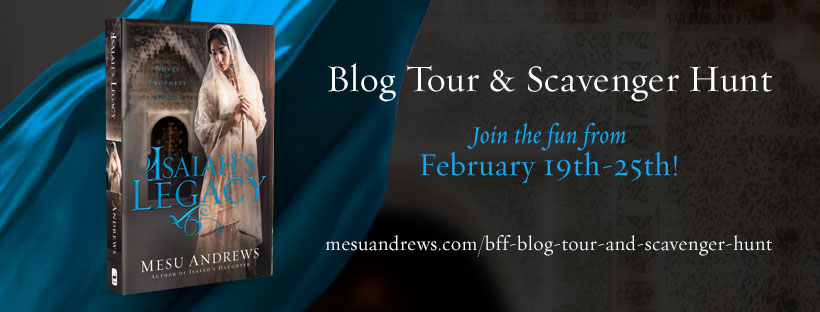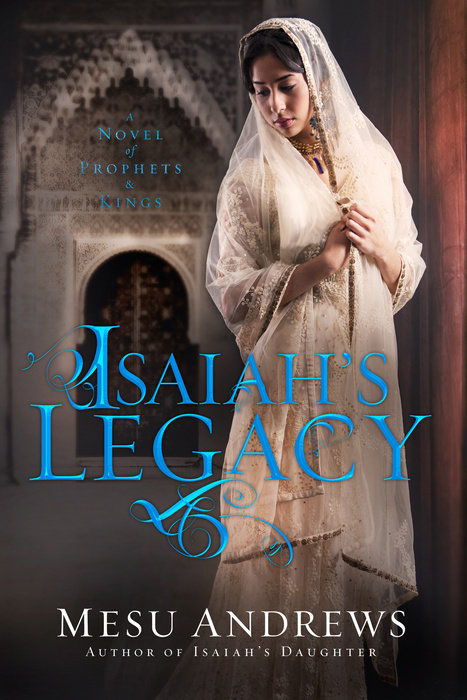Welcome to Isaiah's Legacy Blog Hop Stop #8 Isaiah's Legacy Blog Tour: 3 Answers to Questions About Manasseh by Mesu Andrews
Welcome to Isaiah’s Legacy Blog Hop – Stop #8
1 Week ~ 24 Blogs ~ 3 Incredible Prizes!
Learn a little about Isaiah’s Legacy and enter multiple giveaways while picking up CLUES at each stop. Compile all the clues, submit the final PHRASE at the last stop, and you’ll be entered to win one of 3 Grand Prizes!
What are the prizes? They’re completely unique to the winners!
Mesu will contact each winner personally to chat about what they would most like to see in Israel, and then she’ll SHOP for just the right gift while touring Israel, March 6-19! She’ll then purchase a personal and memorable gift specifically chosen for each of those three winners and ship them to each one when she returns. How fun is that?!
How does the Scavenger Hunt & Blog Tour Work?
· Begin at Stop #1. At the end, you’ll find a CLUE and a link to the next stop. Progress to each stop IN ORDER.
· Collect all the clues—in order—and submit the full phrase at the last blog stop in the Rafflecopter form. Every stop has a clue, so be sure not to skip any along the way!
· You may enter the final giveaway only once and win only one grand prize.
· The Hunt begins 2/19/20 at noon EDT. Deadline for entries is Tuesday, 02/25 at midnight Eastern.
· For best results, hunt through our list using Chrome or Firefox as your browser (not Explorer).
There is NO RUSH to complete the hunt—you have a whole week!
As you visit each blog, it’s our hope that you get to know Mesu’s BFF team and discover the heart behind Isaiah’s Legacy.
In STOP #7 we posed the three burning questions that drove me when I began researching Manasseh’s story for Isaiah’s Legacy:
1. Why would Manasseh—the son of Hezi and Zibah, two devout Yahweh worshipers—turn so vehemently against Yahweh?
2. Why does the Bible add starry hosts to the list of gods Manasseh worshiped—different gods than those worshiped by his saba Ahaz and other pagan Judean kings before him?
3. Why was Manasseh so violent in his worship (2 Kings 21:16), and whose “innocent blood” filled Jerusalem’s streets?
In this post, we’ll answer those questions and explain how that information formed my creative decisions to form Manasseh’s fictional character in Isaiah’s Legacy.
Why So Vehemently Anti-Yahweh?
“Before Isaiah had left the middle court, the word of the Lord came to him: ‘Go back and tell Hezekiah, “…I will heal you…I will add fifteen years to your life.” 2 Kings 20:4-6 (emphasis added)
“Manasseh was twelve years old when he became king.” 2 Kings 21:1
Since Hezi was given fifteen years’ reprieve from his deadly illness, and Manasseh was twelve when his father died, Manasseh must have been born three years into the fifteen-year reprieve, right?
With parents like Hezi and Zibah, who whole-heartedly trusted Yahweh, they would have believed the prophecy and prepared Manasseh to become king at age twelve. Research shows that the boy was likely made co-regent at age five. He would have been tutored immediately after he was weaned in every subject—especially if he had the kind of intellect to interpret Leviticus fifty-five different ways.
He may have been trained with other children—but likely older kids who were learning the same things. Think about the children you know that are between 5-12 years old. How impressionable are they? How do they act around older kids? They want to fit in and be liked, right?
What if an older girl was added to the class who understood Manasseh’s “peculiar” behavior? How do adolescent boys act around pretty girls? How might the ancient culture—and the responsibilities of a king—change the natural shyness a boy might feel?
Now, consider the boy king with HFA, surrounded by adult advisors who demand his attention and high performance. I imagined most advisors around him would be
Yahwists (Yahweh followers). One advisor (Shebna) could have been a secret pagan—and the most fun of all his teachers. Since HFA individuals find it difficult to discern facial expressions, hidden motives, and non-verbal signs, Manasseh would have been a poor judge of deceptive character.
Impressionable. Grieving. Angry. These are some of the reasons I found for a good kid to turn vehemently against the One, True God.
Why Worship Starry Hosts?
The starry hosts were specifically linked to Babylonian melothesia (healing by magic), using the power of the moon’s rotation and the position of the stars. Today, it’s called, astrology. Yep, same gods, different names.
Try to see the situation through a twelve-year-old boy’s eyes—one who is being subtly tainted by pagan influence. Why wouldn’t Manasseh be drawn to a different set of gods who might heal his father, especially when the Hebrew God his family worshipped pronounced his father’s death sentence through his own grandfather, Isaiah.
Manasseh’s name is listed by both Esarhaddon and Ashurbanipal, kings of Assyria, as a faithful vassal during a time when Esarhaddon restored Babylon’s glory. It wasn’t a huge leap to imagine that Esarhaddon had more than a little influence on a young king who then adopted those Babylonian gods as his own.
Why So Violent & Whose Blood Was Spilt?
Let me emphasize I found NOTHING proving autism made people violent. I purposely wrote a second character with HFA who was caring, kind, and faithful to Yahweh because he made the choice to be so. In all my research, I found people who were responsible for their choices and aware of their emotions.
However, there are those who choose to be violent. Rabbinic tradition agrees that Manasseh likely killed his grandfather, Isaiah the prophet, and perhaps many more of Yahweh’s faithful. Scripture affirms he also sacrificed his own children in the fire (2 Kings 21:6; 2 Chronicles 33:6). I believe the answer to these choices lies in his alliance with Assyrian kings since Assyria was known to be the most ruthless civilization to date.
Though Manasseh’s lack of discernment and tendency toward compulsive behavior may have drawn him into Assyria’s evil web initially, he likely found himself having descended much deeper than he ever wanted or imagined. Isn’t that how sin traps us all?
At STOP #9, you’ll pick up a clue and get a little inside information before hopping over to STOP #10, where we’ll finish the third and last post on Manasseh’s HFA. There you’ll meet a family in which four of the five children have been diagnosed HFA, and after observing their loving and God-honoring environment, I knew Manasseh’s redemptive story HAD to be written!
Keep hopping!
Tweet-Able:
Could Manasseh’s alliance with Assyrian kings been the cause of his over-the-top violence?
Here’s the Stop #8 Stuff!
Clue to Write Down is: Been
Continue on to stop #9:
Tell Tale Book Reviews
Enjoy the Hunt!


This comment has been removed by a blog administrator.
ReplyDelete